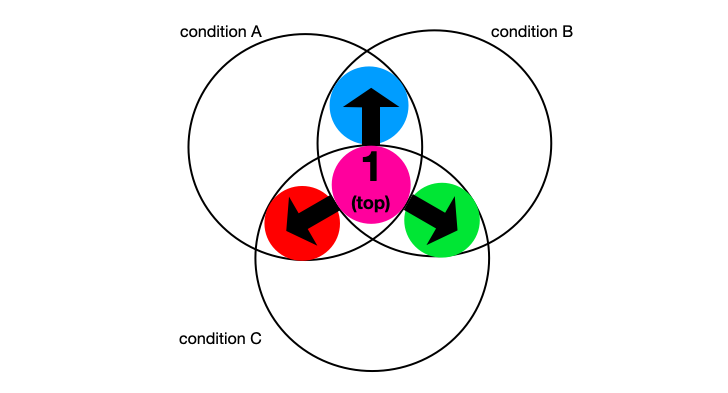
Boot Camp day 03
1. If문
가장 지엽적인? 조건을 최상위로 올린다 (조건들의 교집합에서 바깥쪽 방향으로)
** 그리고 잊지마라 If문은 function 이다!
조건의 중첩과 여집합
※ 주의 ※
⚠️ 큰 조건 하에 하위 조건문 걸기 (연습 필요)
⚠️ 조건에 집중하다 조건 그물망에 걸리지 않는 여집합 (complement set) 놓치지 않기!

예를 들어,
A. 두 가지 조건을 모두 만족하는지 여부(Boolean)를return하는 중첩 if문
B.
C. 세 가지 숫자 데이터를 비교하여 가장 작은 수를return하는 조건문,
✮ 변수를 재할당 하여 출력하도록 짜보기
✮ if문에 else if와 else 가 반드시 따라와야하는 건 아님,
예제 A) ①문자열 word1, word2 의 길이가 홀수이고, ②두 문자열의 길이 모두 8보다 작은지 여부를 리턴하는 함수를 선언하라.
function checklong(word1, word2) {
let a = word1.length,
b = word2.length;
if (a % 2 === 1 && b % 2 === 1) {
if(a < 8 && b < 8) {
return true;
}
return false;
}
return false;
}예제 C) 문자열 데이터 3개를 받아와 가장 짧은 길이의 문자열을 출력하는 함수 bringmeShortword를 선언하라
let wordA;
let wordB;
let wordC;
function bringmeShortword(wordA, wordB, wordC) {
// *하나의 문자열을 가장 짧은 단어로 가정(?)해서 할당
let shortWord = wordA; // 새로운 변수를 선언 및 할당
// 우선 가장 짧은 단어로 할당한 문자열을 다른 하나와 비교
if (wordB.length < shortWord.length) {
// 가장 짧다고 가정한 wordA보다 짧다는 wordB를 shortWord에 재할당
shortWord = wordB; // * let은 다시 쓰지 않는다,
// 그럼 이 조건에 걸려서 내려왔다면 나머지 하나와 비교해야 함
}
if (wordC.length < shortWord.length) {
shortWord = wordC; // 이 조건에도 걸린다면 wordC가 가장 짧다고 판단됨(다음 comment이어-)
// 근데 가장 첫번째(가장 바깥)의 조건에서 제외된다면?
// 처음에 임의로 할당한 wordA는 shortWord가 아니게되며,
// 그럼 다시 나머지 다른 하나와 비교해야 함
// wordA.length < wordB.length, 그럼 wordA와 wordC를 비교해야 함.(가장 짧은 문자열을 찾는 과정 중 이 조건은 최후의 보루(?)이므로)
// shortWord = wordA; // 할당된 변수의 내용이 바뀌지 않음
}
else {
if (wordC.length < shortWord.length) {
shortWord = wordC;
}
}
return shortWord;
}

2개의 if문 병렬되었고(하나는 else if인 셈이라 봐도 되는지? 다른지?)
else로 빠져서 그 안에 조건을 한번 더 걸어서 여집합을 빠트리지 않았다!
💭 if & else 와 지시자
return
함수는 위에서 아래로 순차적으로 내용을 실행한다,
if, else(if) 로 조건에 걸리는 한 경우에만 return하고 싶다거나 (그럼 한번만 return하는 것이고,)
조건을 하나만 걸어도 문제없을 시에는 else없이 바로 return해도 괜찮다.(두 번이상 return 가능한 것이다.)
tip 💡
함수 또는 If문 중첩 시, 간결한 코드 작성을 위해,
✮ 코드 내에서 새로운 변수를 선언 및 할당하는 연습하기
2. 문자열
Property 와 Method
(1) 속성 Property
- 번역어(한국어)로 컴퓨터 언어를 습득하는 데엔 상당히 혼란을 줄 여지가 많다, 하지만 나의 언어로 포인트만 정리 및 표현하자면 'hold'가 가장 와닿는 듯.
*attribute는 또 다른 개념에 포함되는 얘기였던 것 같은데 (리서치 필요)
🙄 What are the properties in JavaScript ?
Properties are the values associated with a JavaScript object.
Properties can usually be changed, added, and deleted, but some are read only.
The syntax for accessing the property of an object is:
i. e.) ObjectName.property /
ObjectName["property"]/
ObjectName[expression]
→ person.age /
person["age"] /
x = "age", person[x]person = [name = 'sootulli', age = 22]
A JavaScript property is a characteristic of an object, often describing attributes associated with a data structure.
There are two kinds of properties: (1) Instance properties hold data that are specific to a given object instance.
(2) Static properties hold data that are shared among all object instances.
A property has a name (a string) and a value (primitive, method, or object reference).
"a property holds an object (reference)"
This distinction matters because the original referenced object remains unchanged when you change the property's value.
(2) 메소드 method
- 한마디 정의, 메소드는 function 이다. function은 뭐다? '작은 기능의 단위'이다!
A method is a function which is a property of an object. There are two kind of methods: Instance Methods which are built-in tasks performed by an object instance, or Static Methods which are tasks that are called directly on an object constructor.
i.g.) str.length, str.indexOf, ... , Math.floor☀︎ Math라는 객체의 메소드
str.slice[index1, index2, ...], str.substring[index1, index2, ...]
☀︎ slice가 범용적, 배열에도 사용 가능
Note: In JavaScript functions themselves are objects, so, in that context, a method is actually an object reference to a function.
함수는 오브젝트의 속성이 될 수도 있음 즉, 함수 오브젝트의 레퍼런스가 메소드인 셈
*오브젝트는 숫자, 문자열 등등의 데이터 타입뿐만 아니라 함수도 받을 수 있음을,
👩🏻💻
굳이굳이 번역어로 생각해본다. 나도 아직 머리에서 영어로 생각하기는 .. 여간 부족 😴
아직은 babyEntry 레벨이기에, 본질적인 개념을 스스로 사고해보는 중
난 수학의 정석도 이렇게 안 했다.
🤓
| 퀴즈 | 71% (5/7 정답)
실수인 셈이긴 하나
매우 주의해야할 지점에서 틀림
1. 결과값을 변수에 바로(한 줄로) 재할당
2. 함수 선언 시(함수 body내에서) 매개변수에 임의로 다른 값을 할당 지양